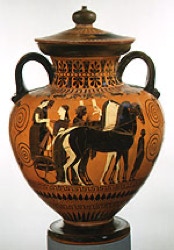Exiles
Translated by Edmund Keeley & Philip Sherrard
It goes on being Alexandria still. Just walk a bit
along the straight road that ends at the Hippodrome
and you'll see palaces and monuments that will amaze you.
Whatever war damage it's suffered,
however much smaller it's become,
it's still a wonderful city.
And then, what with excursions and books
and various kinds of study, time does go by.
In the evenings we meet on the seafront,
the five of us (all, naturally, under fictitious names)
and some of the few other Greeks
still left in the city.
Sometimes we discuss church affairs
(the people here seem to lean toward Rome)
and sometimes literature.
The other day we read some lines by Nonnos:
what imagery, what rhythm, what diction and harmony!
All enthusiasm, how we admired the Panopolitan.
So the days go by, and our stay here
isn't unpleasant because, naturally,
it's not going to last forever.
We've had good news: if something doesn't come
of what's now afoot in Smyrna,
then in April our friends are sure to move from Epiros,
so one way or another, our plans are definitely working out,
and we'll easily overthrow Basil.
And when we do, at last our turn will come.
Notes:
Written October 1914.
The anonymous exiles of the poem cannot be identified precisely,
yet their situation falls within what Cavafy called "historical
possibility." The scene is set in Alexandria, obviously after its
conquest by the Arabs (641) and probably shortly after the
murder of the Byzantine Emperor Michael III by his coemperor
Basil I (867-886), founder of the Macedonian dynasty.
The mention of Christians who "seem to lean toward Rome"
further points to the period of the Photian schism (867-870),
when its initiator, the Patriarch of Constantinople. Photios, had
been deposed by the emperor and most of his friends had been
driven into exile. The "Panopolitan" of line 17 is of course the
Egyptian-Greek poet Nonnus (5th c. A.D.?) mentioned in line 15.

